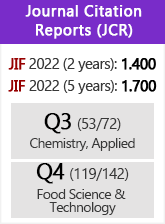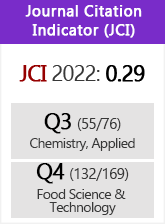Emerging techniques in vegetable oil analysis using stable isotope ratio mass spectrometry
DOI:
https://doi.org/10.3989/gya.2002.v53.i1.288Keywords:
Analysis, Stable isotope ratio mass spectrometry, Vegetable oilAbstract
As the practice of vegetable oil adulteration becomes more sophisticated, the possibility to subvert detection using established techniques such as capillary gas chromatography is increasing. One of the most powerful techniques to be used in food authenticity studies is stable isotope ratio mass spectrometry (SIRMS) which utilises differences in the natural abundance of the stable isotopes of the ‘light’ bio-elements hydrogen, nitrogen, carbon, oxygen and sulfur to detect food fraud. SIRMS has found application in the authentication of a wide range of foodstuffs, including fruit juices, wines, spirits, honey and to detect the adulteration of flavour compounds with synthetic analogues. This papers reviews the current state-of-the-art for the authentication of vegetable oils using SIRMS and highlights emergent techniques such as compound- and position specific-isotope mass spectrometry. These latter developments offer the potential to provide more rapid and improved detection of the economic adulteration of vegetable oils.
Downloads
Download data is not yet available.
Downloads
Published
2002-03-30
How to Cite
1.
Kelly SD, Rhodes C. Emerging techniques in vegetable oil analysis using stable isotope ratio mass spectrometry. Grasas aceites [Internet]. 2002Mar.30 [cited 2024Apr.19];53(1):34-4. Available from: https://grasasyaceites.revistas.csic.es/index.php/grasasyaceites/article/view/288
Issue
Section
Monography
License
Copyright (c) 2002 Consejo Superior de Investigaciones Científicas (CSIC)

This work is licensed under a Creative Commons Attribution 4.0 International License.
© CSIC. Manuscripts published in both the printed and online versions of this Journal are the property of Consejo Superior de Investigaciones Científicas, and quoting this source is a requirement for any partial or full reproduction.All contents of this electronic edition, except where otherwise noted, are distributed under a “Creative Commons Attribution 4.0 International” (CC BY 4.0) License. You may read here the basic information and the legal text of the license. The indication of the CC BY 4.0 License must be expressly stated in this way when necessary.
Self-archiving in repositories, personal webpages or similar, of any version other than the published by the Editor, is not allowed.
















